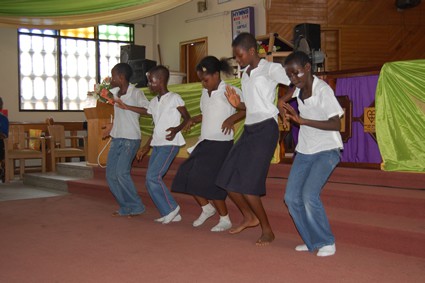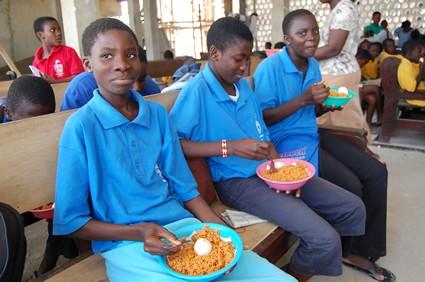Our sponsor tour group received a royal Ghanian welcome when we arrived at the child development center. It was a Saturday, and overcast skies had turned bright blue. Children greeted us with drums and dancing.

Teen girls in Ghana performing a traditional dance
While I won’t soon forget that beautiful welcome, it was a series of conversations with a teenage girl that changed me that day.
Fourteen-year-old Valinda* and I were drawn to one another. She and her precious smile followed me around, and I found myself on the lookout for her throughout the day.
So I was especially troubled when one of the development center workers approached me.
“Talk some sense into this girl! She isn’t coming to the center most Saturdays. She’s in danger of being departed from the program.”
My heart sank for my new friend Valinda. It was an instant wake-up call to be mindful of the older children and adolescents in our programs.
Here are three important things to remember about our adolescent beneficiaries:
- Adolescents have a responsibility to be part of the program. We have a standard that if a child has unjustified absences for two consecutive months, he or she can be departed from the program. We are not providing a handout; we are actively committed to changing the lives of children and young adults.
This means requiring more of them. As a sponsor, you are helping to provide our kids with an opportunity for better life. But they have to show up and participate. - Adolescents still desire to be known and loved. Let’s be honest. Adolescence can be a very awkward time. If you disagree with me, my parents have photo albums I’m sure they’d love to share with you!
Older kids aren’t necessarily as cute as the younger children. They’re trying to figure out their lives in the face of changing hormones, tremendous obstacles and peer pressure.
They may push the limits as they reach out for love. No matter their behavior, adolescents require extra doses of patience, guidance and love (even when they act like they don’t want it!). - Adolescents are more likely to drop out of the program than younger children. We as an organization are still learning how to keep the program relevant and engaging to older beneficiaries. Earlier this year, we created new adolescent curriculum that the child development centers now use.
Another issue we encounter is the reality of older children losing their sponsors for various reasons. An adolescent can be confused as to why his or her sponsor has discontinued the sponsorship.
It can be common for older children to have had a number of sponsors over the years.

Teens in Ghana enjoying lunch
Valinda and I talked and prayed together. I asked her what the consequences would be if she continued to have unexcused absences. She began to understand how she would no longer be able to have a relationship with her sponsor, whom she dearly loved.
I’m happy to report that I recently heard from our staff in Ghana that Valinda is now attending the center regularly and they no longer have any reason to depart her from the program!
A word for those of you who sponsor an older child: Do not grow weary in your encouragement! They need to hear from you now more than ever. Speak into the lives of these older children and teenagers. It could make all the difference.
What do you say to encourage your adolescent child?
*Name changed for privacy







9 Comments |Add a comment
I was in a project in Indonesia recently and they echoed these same concerns. They are having a hard time keeping the older kids, the teenagers interested and motivated to attend. In fact, the older sister of my sponsored teen is sponsored, but does not receive any letters. She is having a really hard time and is not as consistant in going to the activities as her younger sister.
Wow! This is a great encouragement! I sponsor/correspond with mostly teenagers. Three of my twelve children are younger than ten. Sometimes I just don’t know what to write to them. So, thank you for posting this.
I am fixing to go sponsor an adolescent right now. I sponsor several teens and preteens through Compassion already, but for some reason, this post opened my eyes and inspired me to do more. Thank you so much!
These are some great reminders. When I visit project centers, I am normally most interested in learning about the teens, their level of involvement with the project, and what particular “unique” challenges exists for the youth in the area. I have learned that regardless of the country, economic level, or the other obvious differences; teens are teens and the face similar challenges as our teens here in the US. They need to feel the freedom to spread their wings, all the while knowing that there are those who care deeply for them and have no other agenda for their lives except their best interests.
We absolutely love all of our children, including the older ones! What can we do as sponsors to ensure our children are doing as they should as far as attendance, ETC? Is there any way we can make sure our children are attending as they should? How heartbreaking for a sponsor to find out their child was departed from the program because they weren’t regularly attending, but the sponsor had no idea thus didn’t have the chance to help that child… We know the Compassion staff of course does all they can, but as the sponsors we may be able to say something that might make the difference. We can attest to the fact that the older children usually have more than one previous sponsor, and many times they don’t get very many letters. One of our older children had 3 sponsors in the 8 years before we sponsored them, and another had multiple sponsors and only received 7 letters in the 10 years before we began sponsoring them. We encourage our children by telling them God loves them, we love them, specificly naming prayers we’re praying on their behalf, encouraging them and sharing advice as they share goals and struggles, ETC. It is also important to share our goals and struggles with them, so they can see they’re not alone and that if we can make it through with God’s help so can they. 🙂 We’ve shared experiences we’ve gone through as teenagers too, so they can see that we understand personally. I think sometimes teens especially feel that we adults don’t get them or understand what they’re going through. We also try to connect with each child on a very personal level right where they’re at. Maybe it’s sending devotionals based around their favorite sport, sending educational materials to help them in their studies, ETC. We also share what we enjoy about their letters so they know that we truly love and appreciate the time they take to write us. We complement them on how well they answer our questions and how their writing has improved over the years. We tell them we’re proud of them for passing to the next grade in school or for getting medals and trophies in sports competitions. It would be neat to learn more about the curriculum Compassion has recently implemented and how it differs from the previous curriculum? Maybe this would give us some ideas for letters where we can complement the message of the center’s curriculum? Thank you so much for this great post and reminder!
I only take the older kids now to sponsor. I just love carrying on conversations with them. I have found, though, that many of them leave the program early because of school, moving, etc., much more than the younger kids. You also never know what kinds of questions you are going to get 🙂 But the opportunity to encourage someone is is about to live out in the world and faced with adult choices is just priceless.
Thank you for this wonderful post! I appreciate your love to this young girl in Ghana!
I sponsor an older child and love it. He is a quiet, mature, loving young man with a heart for God. I always tell him that I am praying for him, that he is special to me and to God, that he needs to work hard in school.
thank you for this important message. I recently received a letter from my child that I sponsor. It was written by her older sibling. I began to wonder if she was sponsored. Thank you, this brings to light a truth and makes me realize that I need to find out if she needs a sponsor. I have a heart for adolescents. I understand their struggles from personal experience.